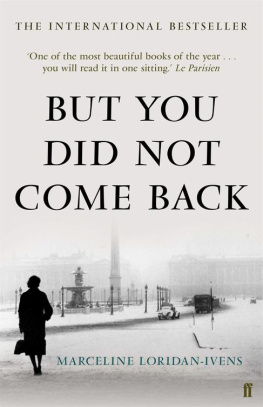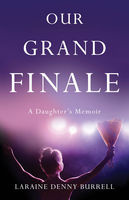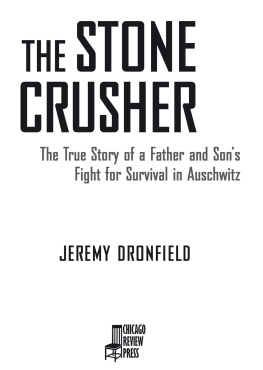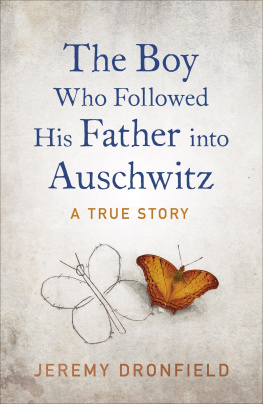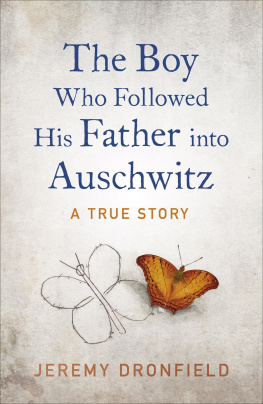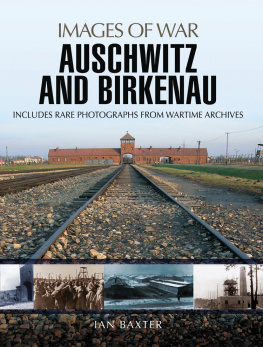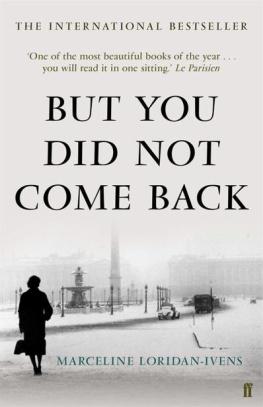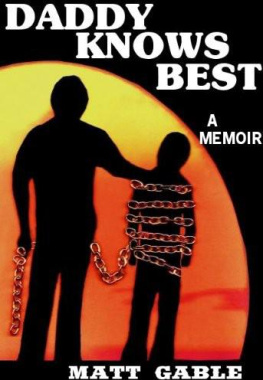I was quite a cheerful person, you know, in spite of what happened to us. We were happy in our own way, as a revenge against sadness, so we could still laugh. People liked that about me. But Im changing. It isnt bitterness, Im not bitter. Its just as if I were already gone. I listen to the radio, to the news, so Im often afraid because I know whats happening. I dont belong here anymore. Perhaps its an acceptance of death, or a lack of will. Im slowing down.
And so I think about you. I can picture the note you managed to get to me back there, a stained little scrap of paper, almost rectangular, torn on one end. I can see your writing, slanted to the right, and four or five sentences that I can no longer remember. Im sure of one line, the first: My darling little girl, and the last line too, your signature: Shlome. But what came in between, I dont know anymore. I try to remember and I cant. I try, but its like a deep hole and I dont want to fall in. So I concentrate on other things: Where did you get that paper and pencil? What did you promise the man who brought me your message? That may seem unimportant today, but then, that piece of paper, folded in four, your writing, the steps of the man walking from you to me, proved that we still existed. Why dont I remember? All I have left is Shlome and his darling little girl. They were deported together. You to Auschwitz, me to Birkenau.
Afterwards, history linked those two places with a simple hyphen. Auschwitz-Birkenau. Some people just say Auschwitz, the largest death camp of the Third Reich. Time obliterates what separated us, it distorts everything. Auschwitz was built behind a little town; Birkenau was in the countryside. It was only when you went out through the large gate with your work detail that you could catch a glimpse of the other camp. The men from Auschwitz looked toward us and thought: Thats where our wives, our sisters, our daughters died; and thats where well end up, in the gas chambers. And I, I looked toward you and wondered, Is it a camp or a town? Has he gone to the gas chamber? Is he still alive? Between us stood fields, prison blocks, watchtowers, barbed wire, crematoriums, and above all else, the unbearable uncertainty of what was happening to us all. It was as if we were separated by thousands of kilometers. The books say it was barely three.
There were very few prisoners who could move between the two camps. He was an electrician; he changed the odd lightbulb in our dark prison block. He appeared one evening. Or it might have been a Sunday afternoon. Anyway, I was there when he came, I heard my name, Rozenberg! He came in, he asked for Marceline. Thats me, I replied. He handed me the scrap of paper, saying: This is a message from your father.
We only had a few seconds, we could have been killed for that simple act. And I had nothing to answer you with, no paper, no pencil, objects no longer existed in our livesthey formed mountains in the storehouses where we worked, objects belonged to the dead. We were slaves: all we had was a spoon wedged into a seam, a pocket, or a shoulder strap, and a band tied around our waista bit of fabric torn from our clothes or a thin rope found on the groundto hang our metal bowl from. So I took out the gold coin Id stolen while I was sorting out the clothes. Id found it in a hem, hidden as if it were some poor mans treasure, and Id wrapped it up in a piece of cloth; I didnt know what to do with it, or where to hide it, or how to trade it on the camps black market. I handed it to the electrician, I wanted him to give it to you, I knew hed steal it, everyone stole in the camp; in our block, you could always hear people crying: Someone stole my bread! So I stammered in a mixture of Yiddish and German Id learned in the camp that if he intended to keep it, he should give you half. Did you get it? Ill never know. I read your note right away, Im sure of that. I didnt show it to anyone but I told everyone there, My father wrote to me.
Other words you said haunted me then. Those words were more important than anything. You said them at Drancy, when we still didnt know where we were going. Like everyone else, we said over and over again: Were going to Pitchipo, that Yiddish word that stands for an unknown destination and sounds so sweet to children. They would use it when they talked about trains as they set off: Theyre going to Pitchipo, theyd say out loud, to reassure themselves after the adults had whispered it to them. But I was no longer a child. I was a big girl, as they say. In my bedroom at the chteau, Id redecorated, put a stop to my dreams, got rid of my toys, drawn many Crosses of Lorraine on the wall, and hung pictures above my sky-blue desk, portraits of generals from the first warHoche, Foch, Joffreleft in the attic by the previous owner. Do you remember when the principal of the school in Orange asked to see you? Shed found my private diary that was full of dark rumors and reproaches about the chief supervisor and certain teachers, but most importantly, a fierce defense of de Gaulle. Your daughter will have to appear before the disciplinary committee; it would be better if you withdrew her from school, shed said, in order to protect us. She gave you my diary. You probably read it and found out I was in love with a boy I met on the bus that took us back to Bollne after school; I gave him my bread ration tickets and in exchange, he did my math homework. He wasnt Jewish. You didnt speak to me for two months after that. Wed reached the age when we would fight, a father and his fifteen-year-old daughter.
So at Drancy, you knew very well that nothing escaped me when I saw you and the other men looking so serious, grouped together in the courtyard, united by a whisper, by the same premonition that the trains were headed far away to the east and the lands you all had fled. Well work over there and well see each other on Sundays, Id said. And youd replied: You might come back, because youre young, but I will not come back. That prophecy burned into my mind as violently and definitively as the number 78750 tattooed on my left arm a few weeks later.
That prophecy became a terrifying companion, in spite of myself. I clung on to it sometimes; I loved those first words when my friends, and the ones who werent my friends, disappeared one by one. Then I rejected your prophecy, I hated the words I will not come back, words that condemned you, separated us, seemed to offer up your life in exchange for mine. I was still alivewere you?
Then there was the day when we passed each other. My work detail had gone to break up stones, pull along small trucks, and dig ditches along the new road for Crematorium number 5, and we walked in rows of five, as always; we were going back to the camp. It was about six oclock in the evening. Do you know that this moment we shared doesnt belong to just us? That it is part of the memories of the people who survived and is mentioned in their books? For all the dreams of being reunited burst forth in the camp of industrial death, the bodies of all our family who were still alive shuddered when we saw each other, when we broke free from the ranks and ran toward one another. I fell into your arms, fell with all my heartyour prophecy wasnt true, you were alive. They could have judged you useless from the moment youd arrived, you were in your early forties, a bad hernia in your groin meant you had to wear a belt, there was a long scar on your thumb from when you were injured at the factory. But you were still strong enough to be their slave, like me. You were meant to live, not to die. I was so happy to see you! Our senses came alive again, the sense of touch, the feel of a body we loved. That moment would cost us dearly, but for a few precious seconds, it interrupted the merciless script written for us all. An SS officer hit me, called me a whore, for the women werent allowed to talk to the men. Shes my daughter! you cried, still holding me tightly in your arms. Shlome and his darling little girl. We were both alive. Your logic didnt hold up anymore, age had nothing to do with itno logic existed in the camp, the only thing that counted was their obsession with numbers. Wed either die right away or a little later, but we wouldnt make it out alive. I had just enough time to give you the name of my prison block: Im in 27B.

